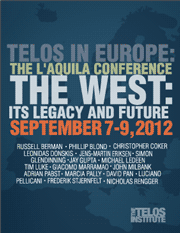By Alessandro Vitale · Friday, January 25, 2013 The following paper was presented at Telos in Europe: The L’Aquila Conference, held on September 7-9, 2012, in L’Aquila, Italy.
 “Russia and the West” is a topic that never seems to be exhausted, and as a question, one that can never be answered satisfactorily. People and intellectuals use a staggering number of criteria to determine Russia’s suitability (or lack thereof) to be counted “Western,” ranging from the geographic and the linguistic to the political and institutional. For centuries, Russians have wondered if they are part of “Europe.” It is evident that geographically and culturally they are “Eurasians.” In any case, about three-quarters of the Russian population live west of the Urals, in what has always been considered a part of Europe. Russia has been connected to Europe for centuries. All the important movements, relevant things that Russia has made in history, have been through its connection to Europe. Russia has really been and remains an important part of Europe. But Russia is not only Europe. “Russia and the West” is a topic that never seems to be exhausted, and as a question, one that can never be answered satisfactorily. People and intellectuals use a staggering number of criteria to determine Russia’s suitability (or lack thereof) to be counted “Western,” ranging from the geographic and the linguistic to the political and institutional. For centuries, Russians have wondered if they are part of “Europe.” It is evident that geographically and culturally they are “Eurasians.” In any case, about three-quarters of the Russian population live west of the Urals, in what has always been considered a part of Europe. Russia has been connected to Europe for centuries. All the important movements, relevant things that Russia has made in history, have been through its connection to Europe. Russia has really been and remains an important part of Europe. But Russia is not only Europe.
Continue reading →
By Frederik Stjernfelt · Tuesday, November 22, 2011 The following talk was presented at the Central European Forum, held in Bratislava, on November 16–19, 2011. Telos Press looks forward to publishing Democratic Contradictions of Multiculturalism by Jens-Martin Erikson and Frederik Stjernfelt, scheduled to appear in March 2012.
“The language of fear” is the headline of this section at the Central European Forum. My contention is that fear is best fought in open democratic debate. Yesterday, Pascal Bruckner said that Europe did not sufficiently stand up for its own core values. One, central, of those values is free speech. As I cannot address all problems at the same time, let me on focus upon this particular problem in this context. Free speech is a European heritage: originating in Holland and England, and first formalized in Denmark, France, and the United States in the second half of the 18th century. But a major contemporary problem in Europe is what could be called the “legislation of fear,” the increasing belief that unwelcome utterances are best fought by means of legislation, prohibition, criminalization—in short, by the curtailment of free speech. The most terrible aspect about this development is that it plays into the hands of terrorists wishing to fight free speech. Let me mention but two examples from Europe in the recent weeks. The German so-called “Döner killings” of Turkish immigrants were finally resolved and a neo-Nazi group in Zwickau claimed responsibility. In their posthumous manifesto, the two central members claimed they fought, among other things, for the radical change of freedom of opinion. In Paris, unknown arsonists burned down the offices of the satirical weekly Charlie Hebdo—no doubt because of the weekly’s focus upon the current development of sharia policies for Tunisia and Libya. So both the neo-Nazi right wing and the islamist right wing agree upon the fight against free speech as a common denominator.
Continue reading →
|
|
 “Russia and the West” is a topic that never seems to be exhausted, and as a question, one that can never be answered satisfactorily. People and intellectuals use a staggering number of criteria to determine Russia’s suitability (or lack thereof) to be counted “Western,” ranging from the geographic and the linguistic to the political and institutional. For centuries, Russians have wondered if they are part of “Europe.” It is evident that geographically and culturally they are “Eurasians.” In any case, about three-quarters of the Russian population live west of the Urals, in what has always been considered a part of Europe. Russia has been connected to Europe for centuries. All the important movements, relevant things that Russia has made in history, have been through its connection to Europe. Russia has really been and remains an important part of Europe. But Russia is not only Europe.
“Russia and the West” is a topic that never seems to be exhausted, and as a question, one that can never be answered satisfactorily. People and intellectuals use a staggering number of criteria to determine Russia’s suitability (or lack thereof) to be counted “Western,” ranging from the geographic and the linguistic to the political and institutional. For centuries, Russians have wondered if they are part of “Europe.” It is evident that geographically and culturally they are “Eurasians.” In any case, about three-quarters of the Russian population live west of the Urals, in what has always been considered a part of Europe. Russia has been connected to Europe for centuries. All the important movements, relevant things that Russia has made in history, have been through its connection to Europe. Russia has really been and remains an important part of Europe. But Russia is not only Europe. 

